备考2011高效学习方案英语高一册:unit 21 body language
文档属性
| 名称 | 备考2011高效学习方案英语高一册:unit 21 body language | 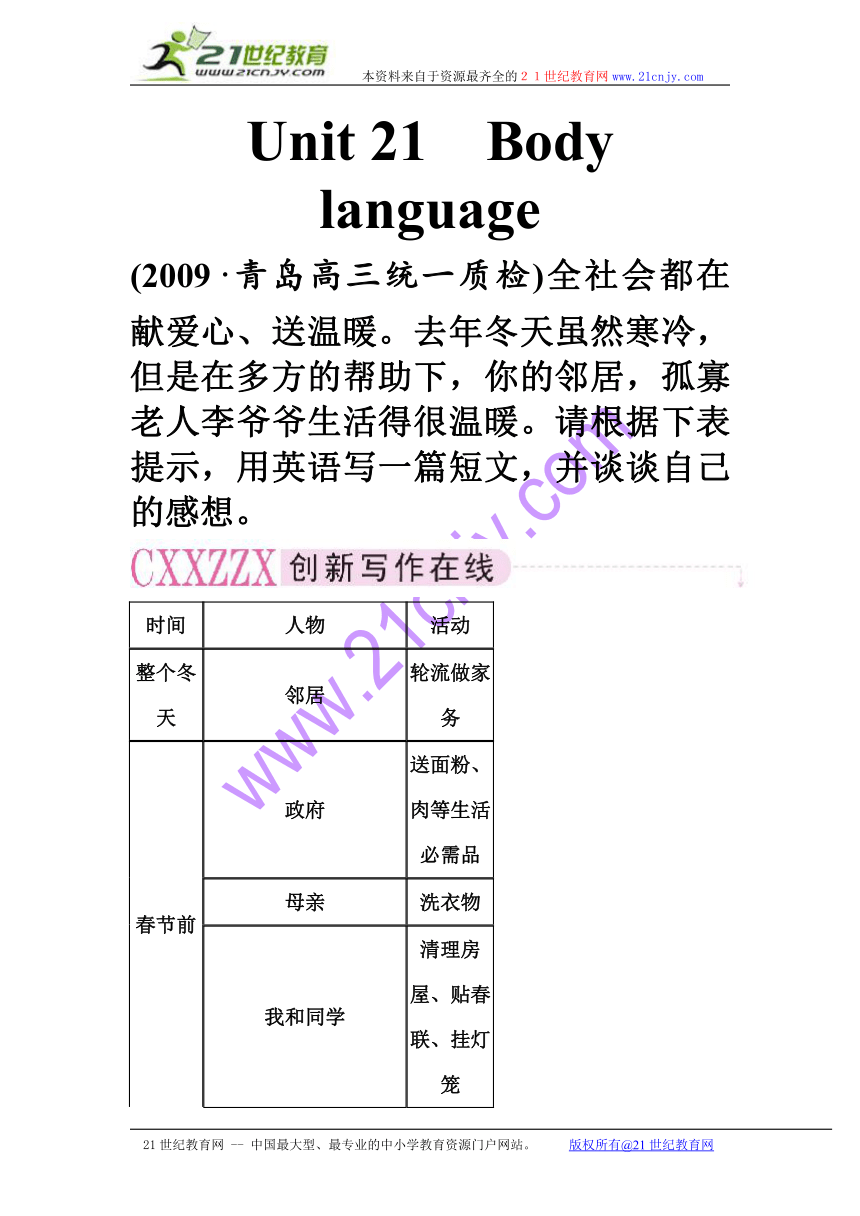 | |
| 格式 | rar | ||
| 文件大小 | 212.4KB | ||
| 资源类型 | 教案 | ||
| 版本资源 | 人教版 | ||
| 科目 | 英语 | ||
| 更新时间 | 2010-12-14 17:12:00 | ||
图片预览

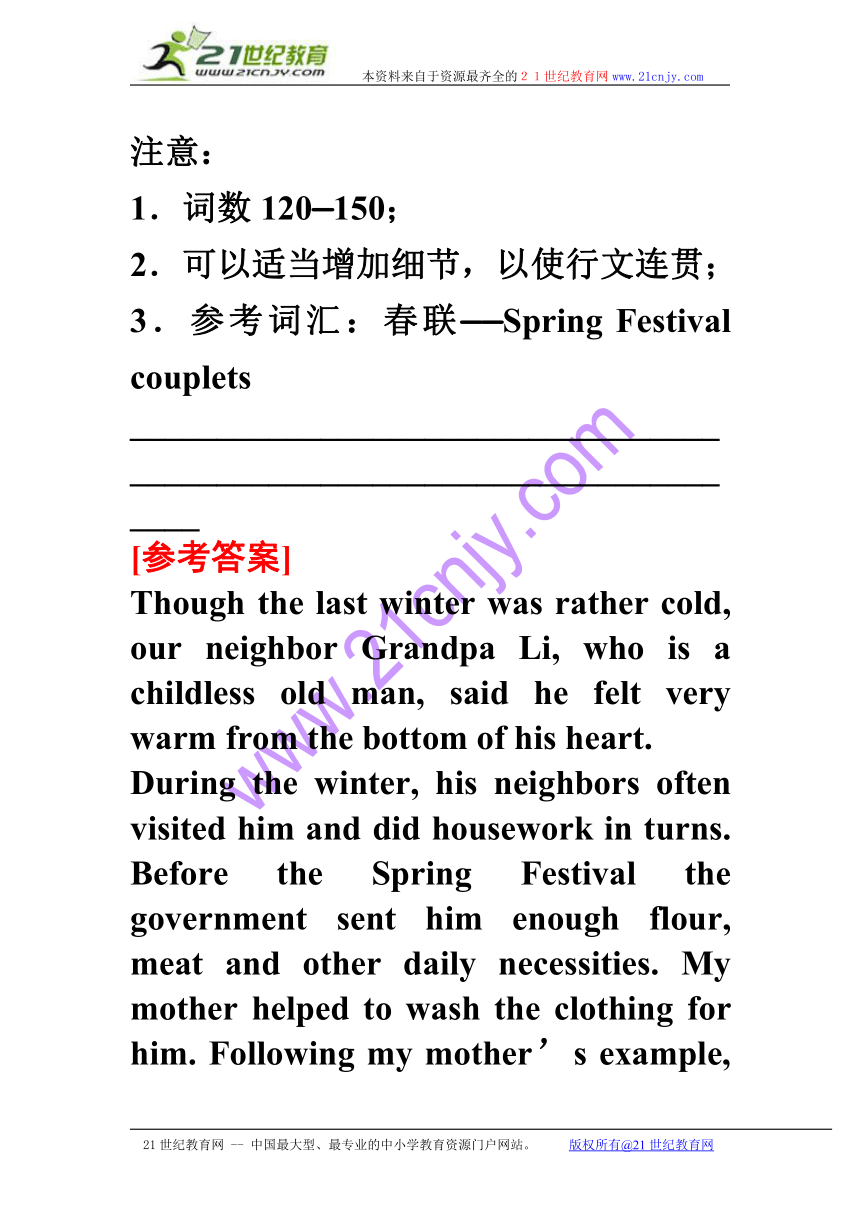
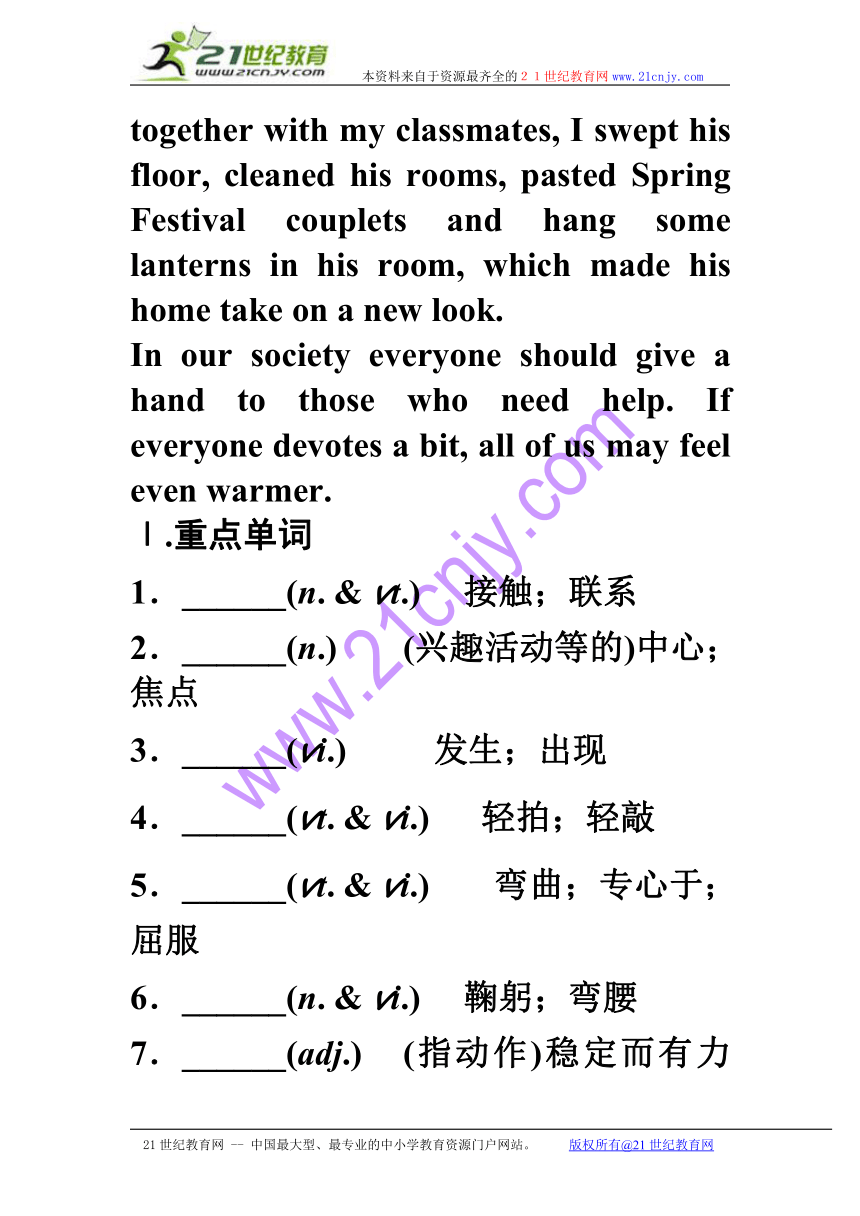
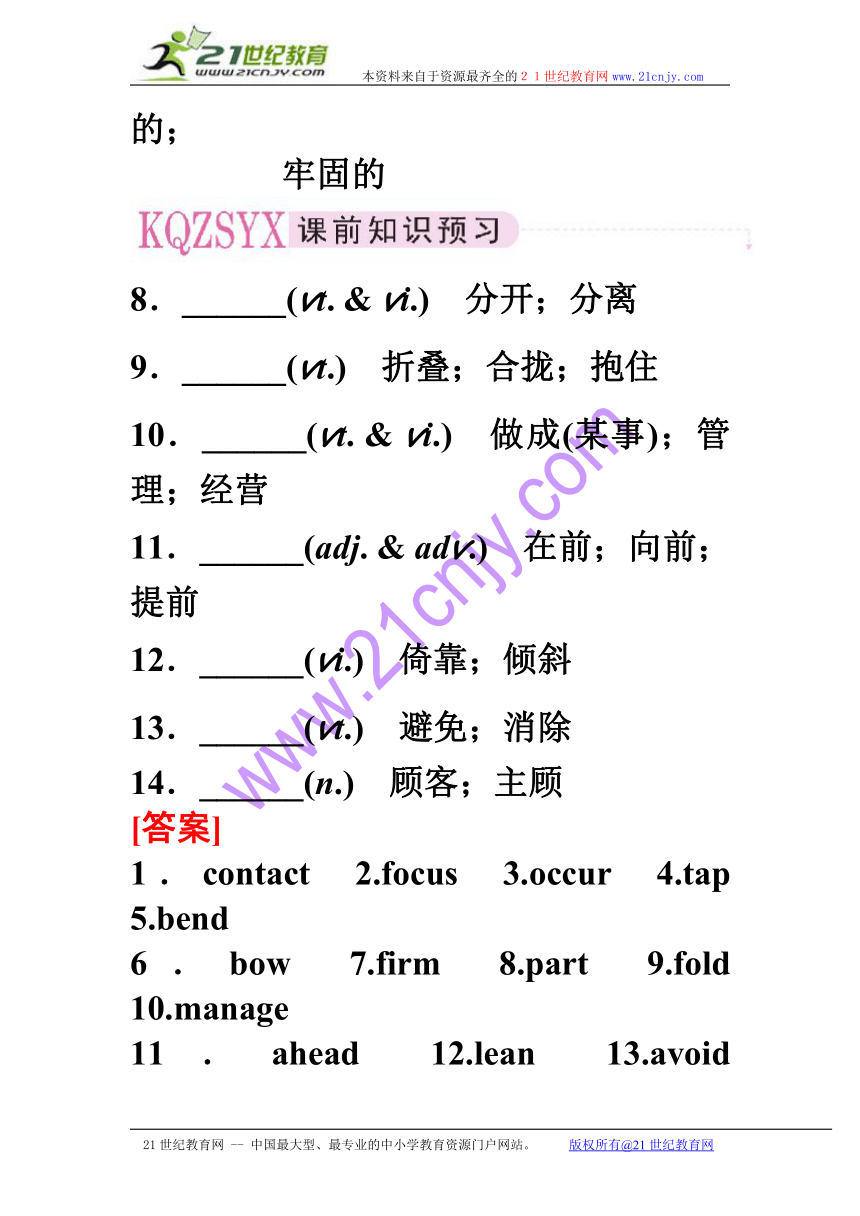
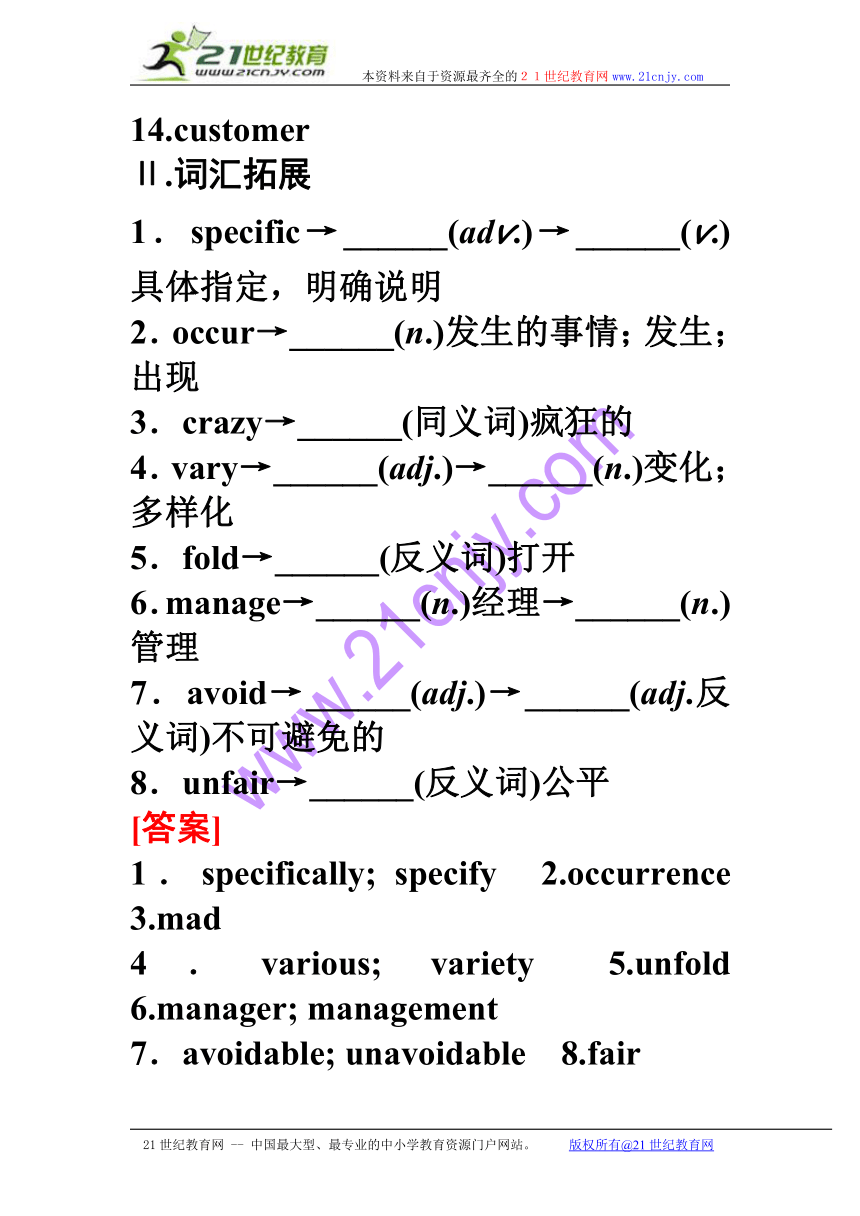
文档简介
本资料来自于资源最齐全的21世纪教育网www.21cnjy.com
Unit 21 Body language
(2009·青岛高三统一质检)全社会都在献爱心、送温暖。去年冬天虽然寒冷,但是在多方的帮助下,你的邻居,孤寡老人李爷爷生活得很温暖。请根据下表提示,用英语写一篇短文,并谈谈自己的感想。
时间 人物 活动
整个冬天 邻居 轮流做家务
春节前 政府 送面粉、肉等生活必需品
母亲 洗衣物
我和同学 清理房屋、贴春联、挂灯笼
注意:
1.词数120—150;
2.可以适当增加细节,以使行文连贯;
3.参考词汇:春联——Spring Festival couplets
________________________________________________________________________
[参考答案]
Though the last winter was rather cold, our neighbor Grandpa Li, who is a childless old man, said he felt very warm from the bottom of his heart.
During the winter, his neighbors often visited him and did housework in turns. Before the Spring Festival the government sent him enough flour, meat and other daily necessities. My mother helped to wash the clothing for him. Following my mother’s example, together with my classmates, I swept his floor, cleaned his rooms, pasted Spring Festival couplets and hang some lanterns in his room, which made his home take on a new look.
In our society everyone should give a hand to those who need help. If everyone devotes a bit, all of us may feel even warmer.
Ⅰ.重点单词
1.______(n. & vt.) 接触;联系
2.______(n.) (兴趣活动等的)中心;焦点
3.______(vi.) 发生;出现
4.______(vt. & vi.) 轻拍;轻敲
5.______(vt. & vi.) 弯曲;专心于;屈服
6.______(n. & vi.) 鞠躬;弯腰
7.______(adj.) (指动作)稳定而有力的;
牢固的
8.______(vt. & vi.) 分开;分离
9.______(vt.) 折叠;合拢;抱住
10.______(vt. & vi.) 做成(某事);管理;经营
11.______(adj. & adv.) 在前;向前;提前
12.______(vi.) 倚靠;倾斜
13.______(vt.) 避免;消除
14.______(n.) 顾客;主顾
[答案]
1.contact 2.focus 3.occur 4.tap 5.bend
6.bow 7.firm 8.part 9.fold 10.manage
11.ahead 12.lean 13.avoid 14.customer
Ⅱ.词汇拓展
1.specific→______(adv.)→______(v.)具体指定,明确说明
2.occur→______(n.)发生的事情;发生;出现
3.crazy→______(同义词)疯狂的
4.vary→______(adj.)→______(n.)变化;多样化
5.fold→______(反义词)打开
6.manage→______(n.)经理→______(n.)管理
7.avoid→______(adj.)→______(adj.反义词)不可避免的
8.unfair→______(反义词)公平
[答案]
1.specifically; specify 2.occurrence 3.mad
4.various; variety 5.unfold 6.manager; management
7.avoidable; unavoidable 8.fair
Ⅲ.重点短语
1.______ order 按顺序;整齐
2.______ a face (对某人)做鬼脸;扮怪相
3.hold ______ 举起;举出;拿起
4.vary ______ A ______ B 从A到B不等
5.feel ______ 情绪低落;感到失望
6.tear ______ 弄倒某物;拆除某物
7.get ______ 通过;度过;到达
8.______...on 把……靠在;倚靠着
9.look ______ sb.’s eyes 直视某人
10.give sb. a ______ 给某人帮助
11.ahead ______ (在空间或时间上比某人、
某物)更靠前;更早
[答案]
1.in 2.make 3.up 4.from; to 5.down 6.down
7.through 8.rest 9.into 10.hand 11.of
Ⅳ.重点句型
1.While there are many different interpretations of our body language, some gestures seem to be universal.
尽管对于身势语的解释五花八门,但某些手势似乎是全球通用的。
2.Pressing one’s palms together and...while closing the eyes as if sleeping means “I’m tired”.
双手合十……同时闭上眼睛好像睡着的样子,意思是“我累了”。
Ⅴ.重点语法
v.-ing形式作主语、宾语和表语
Ⅰ.词汇聚焦
1.unfair adj. 不公正的;不公平的
2.vary v. 改变;变化;使多样化
[思维拓展]
vary+adv.或vary+n.
Her mood varies from day to day.
vi. (在……方面)相异,不同,形形色色
These sweaters vary in size/color.
variety n. 多变性,多样性;种种
various adj. 各种各样的;形形色色的
It is obvious that the weather here ______ with seasons.
A. varies B. changes
C. differs D. A or B
解析:句意为“很明显该处的天气随季节而变化。”differ意为“区别”。
答案:D
3.avoid vt. 逃避……,避免……
avoid+n./doing sth.
[思维拓展]
英语中某些及物动词后习惯跟动名词作宾语,这类动词是:
避免、错过、少延期(avoid, miss, put off)
建议、完成、多练习(suggest, finish, practise)
喜欢、想象、禁不住(enjoy, imagine, can’t help)
承认、否定、与嫉妒(admit, deny, envy)
逃避、冒险、莫原谅(escape, risk, excuse)
忍受、保持、不介意(stand, keep, mind)
Last night I didn’t go to bed until I finished ______ my report.
A. writing B. to write
C. type D. write
解析:finish后须用动名词作宾语。
答案:A
4.occur v. 发生;出现
[思维拓展]
①occur to...想起,想到
It occurs to sb. to do sth.
It occurs to sb. that...
②happen to sb.某人发生……
③take place发生
[指点迷津]
occur, happen, take place都不用于被动语态。
This name just didn’t ______ my memory.
A. happen to B. happen in
C. occur in D. occur to
解析:“想起,想到”用occur to...,不用happen。
答案:D
5.ahead adj. & adv. 在前,向前,提前,在前面
[思维拓展]
look ahead为未来着想或打算;未雨绸缪
go ahead(with)进行;开始;往下说;用吧;干吧
get ahead(of)胜过,超过
be ahead(of)占优势,渴望取胜;赚钱
ahead of time提前
[注]a+n.构成副词:away, aside, ashore, aboard。
He is so diligent a student that he is always ______ his classmates in every subject.
A. in advance B. in front of
C. far ahead of D. before
解析:根据句意可知,此处意思应为“胜过,超过”,即be ahead of others,故选C。选项B、D一般指位置,in advance“预先”,故排除。
答案:C
6.manage v. 做成(某事);管理;经营
[思维拓展]
manage a supermarket (business, factory)
管理超市(企业、工厂)
manager n. 经理,管理人员
manage to do sth.(=succeed in doing sth.)
设法做成了某事
try to do sth.努力/设法做成某事(未知成功与否)
manage about...设法处理,解决
manage with...以……设法应付
manage without (=go without)应付,将就
The earthquake survivor, who was an old lady of more than eighty, ______ to live without food and water for nearly two weeks and was helped out in the end.
A. kept B. tried
C. managed D. succeeded
解析:keep后一般接动名词而非不定式作其宾语;succeed后接in doing sth.;由句意可知,这位老太太已获救,故排除B。
答案:C
7.part v. 分开;分离
[思维拓展]
part from使分开
part as分开
part with让出;舍弃
part n. 部分;职责;作用;地区
do one’s part尽自己的一份力量
for one’s part就……而言
for the most part大部分;通常
play a part扮演角色;起作用
take part in参与;参加
Ⅱ.短语突破
1.hold up举起;拿起;举出
[思维拓展]
hold back阻碍
hold down镇压
hold on坚持下去;别挂(电话)
hold on to紧紧抓住;不放弃
hold out坚持
—Why are you so late
—Bad luck. A car accident happened not far outside the town and we were ______ on the way.
A. stopped B. kept
C. held up D. held on
解析:由题意可知,我们在路上受阻,所以来晚了。而A项表示“被拦住(走不了)”。
答案:C
2.get through通过;(电话)接通;完成;翻阅;浏览
[思维拓展]
get through a tunnel穿过隧道
get through the work完成工作
get through the book读完这本书
get through the exams通过考试
I can’t get through.我打不通电话。
put/get sb. through to...给某人接通……(电话)
[指点迷津]
get/put sb. through to给某人接通到
go through通过,经历,搜遍
pass through从……中经过,走过……中
look through浏览;仔细查看
live through经过……后仍活着
break through突破(障碍)
John ______ the examination, which made his parents happy.
A. got through B. carried on
C. stuck to D. kept on
解析:句子的意思是“约翰通过了考试,这使得他父母很高兴。”get through the exams的意思是“通过考试”;carry on的意思是“继续进行”;stick to的意思是“坚持(原理,理论的观点等)”;keep on的意思是“继续,反复”。
答案:A
3.tear down弄倒某物;拆除某物
[思维拓展]
tear...open把……撕开
tear...apart拆散,使分离
tear off扯掉
tear up撕裂;撕毁
tear oneself away from忍痛舍去,忍痛离开
tear sth. into pieces把……撕成碎片
tear at sth.撕扯某物
Ⅲ.句型归纳
1.Perhaps the best example of universally understood body language is the smile.或许世界各地最易理解的肢体语言就是微笑。
[思维拓展]
句中understood为过去分词作定语。
[指点迷津]
动词的现在分词一般式表示动作正在进行,而且与所修饰的名词之间是逻辑上的主谓关系;及物动词的过去分词表示动作完成而且表示被动,而不及物动词的过去分词只表示动作完成,不表示被动意义。
2.While there are many different interpretations of our body language, some gestures seem to be universal.尽管对身势语有许多不同解释,有些动作却好像是全球化的。
[指点迷津]
while此处是引导让步状语从句,意为“尽管;虽然”;而不是时间状语从句“当……时候”;也不是表对比,作“而,然而”讲。
While I understand your viewpoint, I don’t agree with you.虽然我了解你的见解,我却不同意你。
______ modeling business is by no means easy to get into, the good model will always be in demand.
A. While B. Since
C. As D. If
解析:句意:尽管模特行业很难进入,但好的模特总是供不应求。while“尽管”,表让步。
答案:A
3.Would you like me to help you with it?你愿意让我帮你(搬箱子)吗?
[指点迷津]
would like=would love/should like
①would like常用来表示有礼貌的请求或表示个人意愿,意为“想要,愿意”,其后常接名词、代词、动词不定式的完成式或含有不定式的复合结构。
②would like后接动词不定式,在简略回答中,常用省略形式,即动词不定式只保留不定式符号to。
③would like与动词不定式完成式连用常表示主语希望做而未做过的事情。
I’d like to have seen his face when he opened the letter.我真希望看见了他拆信时的脸色。
I would love ______ to the party last night but I had to work extra hours to finish a report.
A. to go B. to have gone
C. going D. having gone
解析:would love后接不定式,排除C、D项;根据句意可知是表达对已经发生的事的意愿,须用不定式的完成式。
答案:B
4.How could you ask for help?你如何请求帮助?
How could you offer help?你如何帮助别人?
[思维拓展]
请求帮助的用法及答语
①Could you help me with...?请帮我……好吗?
Could you please...?请你……好吗?
Could you give me a hand with this
请帮我一下好吗?
②Yes/Sure/Certainly.(当然)可以。
With pleasure.很乐意;当然可以。
③(I’m) Sorry, but...抱歉……
I’m afraid not.恐怕不行。
21世纪教育网 -- 中国最大型、最专业的中小学教育资源门户网站。 版权所有@21世纪教育网
Unit 21 Body language
(2009·青岛高三统一质检)全社会都在献爱心、送温暖。去年冬天虽然寒冷,但是在多方的帮助下,你的邻居,孤寡老人李爷爷生活得很温暖。请根据下表提示,用英语写一篇短文,并谈谈自己的感想。
时间 人物 活动
整个冬天 邻居 轮流做家务
春节前 政府 送面粉、肉等生活必需品
母亲 洗衣物
我和同学 清理房屋、贴春联、挂灯笼
注意:
1.词数120—150;
2.可以适当增加细节,以使行文连贯;
3.参考词汇:春联——Spring Festival couplets
________________________________________________________________________
[参考答案]
Though the last winter was rather cold, our neighbor Grandpa Li, who is a childless old man, said he felt very warm from the bottom of his heart.
During the winter, his neighbors often visited him and did housework in turns. Before the Spring Festival the government sent him enough flour, meat and other daily necessities. My mother helped to wash the clothing for him. Following my mother’s example, together with my classmates, I swept his floor, cleaned his rooms, pasted Spring Festival couplets and hang some lanterns in his room, which made his home take on a new look.
In our society everyone should give a hand to those who need help. If everyone devotes a bit, all of us may feel even warmer.
Ⅰ.重点单词
1.______(n. & vt.) 接触;联系
2.______(n.) (兴趣活动等的)中心;焦点
3.______(vi.) 发生;出现
4.______(vt. & vi.) 轻拍;轻敲
5.______(vt. & vi.) 弯曲;专心于;屈服
6.______(n. & vi.) 鞠躬;弯腰
7.______(adj.) (指动作)稳定而有力的;
牢固的
8.______(vt. & vi.) 分开;分离
9.______(vt.) 折叠;合拢;抱住
10.______(vt. & vi.) 做成(某事);管理;经营
11.______(adj. & adv.) 在前;向前;提前
12.______(vi.) 倚靠;倾斜
13.______(vt.) 避免;消除
14.______(n.) 顾客;主顾
[答案]
1.contact 2.focus 3.occur 4.tap 5.bend
6.bow 7.firm 8.part 9.fold 10.manage
11.ahead 12.lean 13.avoid 14.customer
Ⅱ.词汇拓展
1.specific→______(adv.)→______(v.)具体指定,明确说明
2.occur→______(n.)发生的事情;发生;出现
3.crazy→______(同义词)疯狂的
4.vary→______(adj.)→______(n.)变化;多样化
5.fold→______(反义词)打开
6.manage→______(n.)经理→______(n.)管理
7.avoid→______(adj.)→______(adj.反义词)不可避免的
8.unfair→______(反义词)公平
[答案]
1.specifically; specify 2.occurrence 3.mad
4.various; variety 5.unfold 6.manager; management
7.avoidable; unavoidable 8.fair
Ⅲ.重点短语
1.______ order 按顺序;整齐
2.______ a face (对某人)做鬼脸;扮怪相
3.hold ______ 举起;举出;拿起
4.vary ______ A ______ B 从A到B不等
5.feel ______ 情绪低落;感到失望
6.tear ______ 弄倒某物;拆除某物
7.get ______ 通过;度过;到达
8.______...on 把……靠在;倚靠着
9.look ______ sb.’s eyes 直视某人
10.give sb. a ______ 给某人帮助
11.ahead ______ (在空间或时间上比某人、
某物)更靠前;更早
[答案]
1.in 2.make 3.up 4.from; to 5.down 6.down
7.through 8.rest 9.into 10.hand 11.of
Ⅳ.重点句型
1.While there are many different interpretations of our body language, some gestures seem to be universal.
尽管对于身势语的解释五花八门,但某些手势似乎是全球通用的。
2.Pressing one’s palms together and...while closing the eyes as if sleeping means “I’m tired”.
双手合十……同时闭上眼睛好像睡着的样子,意思是“我累了”。
Ⅴ.重点语法
v.-ing形式作主语、宾语和表语
Ⅰ.词汇聚焦
1.unfair adj. 不公正的;不公平的
2.vary v. 改变;变化;使多样化
[思维拓展]
vary+adv.或vary+n.
Her mood varies from day to day.
vi. (在……方面)相异,不同,形形色色
These sweaters vary in size/color.
variety n. 多变性,多样性;种种
various adj. 各种各样的;形形色色的
It is obvious that the weather here ______ with seasons.
A. varies B. changes
C. differs D. A or B
解析:句意为“很明显该处的天气随季节而变化。”differ意为“区别”。
答案:D
3.avoid vt. 逃避……,避免……
avoid+n./doing sth.
[思维拓展]
英语中某些及物动词后习惯跟动名词作宾语,这类动词是:
避免、错过、少延期(avoid, miss, put off)
建议、完成、多练习(suggest, finish, practise)
喜欢、想象、禁不住(enjoy, imagine, can’t help)
承认、否定、与嫉妒(admit, deny, envy)
逃避、冒险、莫原谅(escape, risk, excuse)
忍受、保持、不介意(stand, keep, mind)
Last night I didn’t go to bed until I finished ______ my report.
A. writing B. to write
C. type D. write
解析:finish后须用动名词作宾语。
答案:A
4.occur v. 发生;出现
[思维拓展]
①occur to...想起,想到
It occurs to sb. to do sth.
It occurs to sb. that...
②happen to sb.某人发生……
③take place发生
[指点迷津]
occur, happen, take place都不用于被动语态。
This name just didn’t ______ my memory.
A. happen to B. happen in
C. occur in D. occur to
解析:“想起,想到”用occur to...,不用happen。
答案:D
5.ahead adj. & adv. 在前,向前,提前,在前面
[思维拓展]
look ahead为未来着想或打算;未雨绸缪
go ahead(with)进行;开始;往下说;用吧;干吧
get ahead(of)胜过,超过
be ahead(of)占优势,渴望取胜;赚钱
ahead of time提前
[注]a+n.构成副词:away, aside, ashore, aboard。
He is so diligent a student that he is always ______ his classmates in every subject.
A. in advance B. in front of
C. far ahead of D. before
解析:根据句意可知,此处意思应为“胜过,超过”,即be ahead of others,故选C。选项B、D一般指位置,in advance“预先”,故排除。
答案:C
6.manage v. 做成(某事);管理;经营
[思维拓展]
manage a supermarket (business, factory)
管理超市(企业、工厂)
manager n. 经理,管理人员
manage to do sth.(=succeed in doing sth.)
设法做成了某事
try to do sth.努力/设法做成某事(未知成功与否)
manage about...设法处理,解决
manage with...以……设法应付
manage without (=go without)应付,将就
The earthquake survivor, who was an old lady of more than eighty, ______ to live without food and water for nearly two weeks and was helped out in the end.
A. kept B. tried
C. managed D. succeeded
解析:keep后一般接动名词而非不定式作其宾语;succeed后接in doing sth.;由句意可知,这位老太太已获救,故排除B。
答案:C
7.part v. 分开;分离
[思维拓展]
part from使分开
part as分开
part with让出;舍弃
part n. 部分;职责;作用;地区
do one’s part尽自己的一份力量
for one’s part就……而言
for the most part大部分;通常
play a part扮演角色;起作用
take part in参与;参加
Ⅱ.短语突破
1.hold up举起;拿起;举出
[思维拓展]
hold back阻碍
hold down镇压
hold on坚持下去;别挂(电话)
hold on to紧紧抓住;不放弃
hold out坚持
—Why are you so late
—Bad luck. A car accident happened not far outside the town and we were ______ on the way.
A. stopped B. kept
C. held up D. held on
解析:由题意可知,我们在路上受阻,所以来晚了。而A项表示“被拦住(走不了)”。
答案:C
2.get through通过;(电话)接通;完成;翻阅;浏览
[思维拓展]
get through a tunnel穿过隧道
get through the work完成工作
get through the book读完这本书
get through the exams通过考试
I can’t get through.我打不通电话。
put/get sb. through to...给某人接通……(电话)
[指点迷津]
get/put sb. through to给某人接通到
go through通过,经历,搜遍
pass through从……中经过,走过……中
look through浏览;仔细查看
live through经过……后仍活着
break through突破(障碍)
John ______ the examination, which made his parents happy.
A. got through B. carried on
C. stuck to D. kept on
解析:句子的意思是“约翰通过了考试,这使得他父母很高兴。”get through the exams的意思是“通过考试”;carry on的意思是“继续进行”;stick to的意思是“坚持(原理,理论的观点等)”;keep on的意思是“继续,反复”。
答案:A
3.tear down弄倒某物;拆除某物
[思维拓展]
tear...open把……撕开
tear...apart拆散,使分离
tear off扯掉
tear up撕裂;撕毁
tear oneself away from忍痛舍去,忍痛离开
tear sth. into pieces把……撕成碎片
tear at sth.撕扯某物
Ⅲ.句型归纳
1.Perhaps the best example of universally understood body language is the smile.或许世界各地最易理解的肢体语言就是微笑。
[思维拓展]
句中understood为过去分词作定语。
[指点迷津]
动词的现在分词一般式表示动作正在进行,而且与所修饰的名词之间是逻辑上的主谓关系;及物动词的过去分词表示动作完成而且表示被动,而不及物动词的过去分词只表示动作完成,不表示被动意义。
2.While there are many different interpretations of our body language, some gestures seem to be universal.尽管对身势语有许多不同解释,有些动作却好像是全球化的。
[指点迷津]
while此处是引导让步状语从句,意为“尽管;虽然”;而不是时间状语从句“当……时候”;也不是表对比,作“而,然而”讲。
While I understand your viewpoint, I don’t agree with you.虽然我了解你的见解,我却不同意你。
______ modeling business is by no means easy to get into, the good model will always be in demand.
A. While B. Since
C. As D. If
解析:句意:尽管模特行业很难进入,但好的模特总是供不应求。while“尽管”,表让步。
答案:A
3.Would you like me to help you with it?你愿意让我帮你(搬箱子)吗?
[指点迷津]
would like=would love/should like
①would like常用来表示有礼貌的请求或表示个人意愿,意为“想要,愿意”,其后常接名词、代词、动词不定式的完成式或含有不定式的复合结构。
②would like后接动词不定式,在简略回答中,常用省略形式,即动词不定式只保留不定式符号to。
③would like与动词不定式完成式连用常表示主语希望做而未做过的事情。
I’d like to have seen his face when he opened the letter.我真希望看见了他拆信时的脸色。
I would love ______ to the party last night but I had to work extra hours to finish a report.
A. to go B. to have gone
C. going D. having gone
解析:would love后接不定式,排除C、D项;根据句意可知是表达对已经发生的事的意愿,须用不定式的完成式。
答案:B
4.How could you ask for help?你如何请求帮助?
How could you offer help?你如何帮助别人?
[思维拓展]
请求帮助的用法及答语
①Could you help me with...?请帮我……好吗?
Could you please...?请你……好吗?
Could you give me a hand with this
请帮我一下好吗?
②Yes/Sure/Certainly.(当然)可以。
With pleasure.很乐意;当然可以。
③(I’m) Sorry, but...抱歉……
I’m afraid not.恐怕不行。
21世纪教育网 -- 中国最大型、最专业的中小学教育资源门户网站。 版权所有@21世纪教育网
同课章节目录
